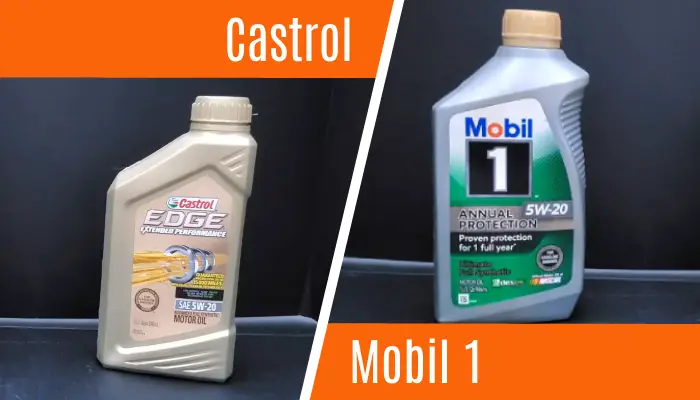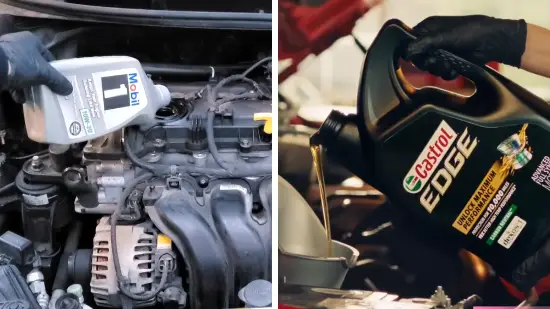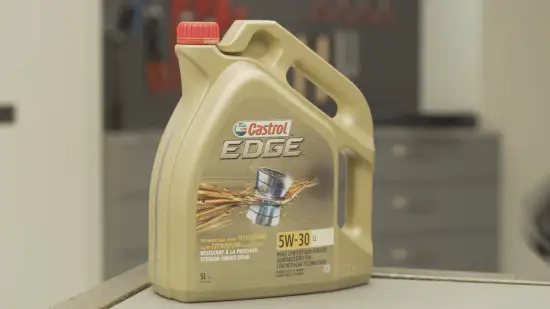Physical Address
304 North Cardinal St.
Dorchester Center, MA 02124
Physical Address
304 North Cardinal St.
Dorchester Center, MA 02124

Maintaining the health of your vehicle’s engine requires the selection of the appropriate engine oil. Castrol and Mobil 1 are two of the most reputable brands in the market, known for their synthetic engine oils. Understanding the differences between these two brands can help you choose wisely.
First of all, brand ownership and history play a role, as BP owns Castrol while ExxonMobil owns Mobil 1. Castrol Edge is designed for gasoline direct injected (GDI) engines because of their lower calcium content. In contrast, Mobil 1 is known for its superior performance in the NOACK Volatility test.
As we go through this article, we’ll analyze the differences between these two automotive engine oil and explore environmental considerations. So buckle up and get ready to make a wise decision.
No products found.

When comparing Castrol and Mobil 1 engine oil for vehicles, there are several important differences to consider.
Castrol is owned by British Petroleum (BP), a global energy company founded in 1908. BP’s long-standing presence in the automotive industry has allowed Castrol to benefit from its extensive resources and expertise.
On the other hand, Mobil 1 is a brand of ExxonMobil, another major player in the energy sector with a legacy dating back to the late 19th century. ExxonMobil’s vast experience and technological advancements have contributed to the development of Mobil 1 as a high-performance engine oil.
Both companies have a great reputation in the industry, and their brand ownership and legacy contribute to consumer trust and confidence.
Both brands offer 5W20 oils, which means they meet specific viscosity requirements set by the Society of Automotive Engineers (SAE). The viscosity of an engine oil refers to its resistance to flow at different temperatures.
Although both Castrol and Mobil 1 meet the SAE 5W20 viscosity rating, there may be slight variations in their performance due to differences in additives and base oil formulations.
Castrol Edge, with its Titanium technology, is designed specifically for high-end car models like Volkswagen, Audi, Land Rover, and Jaguar. The unique formulation of Castrol Edge provides excellent protection and performance, making it ideal for these luxury vehicles.
In contrast, Mobil 1 is known for its ability to protect engines under harsh conditions. It’s particularly suitable for modern vehicles that require enhanced engine protection.
Regarding test results, Mobil 1 has shown superior performance in the NOACK Volatility test, indicating its ability to resist high-temperature evaporation. This is crucial in maintaining the integrity of the engine oil under extreme conditions.
Conversely, Castrol Edge has a lower calcium content, which makes it more compatible with gasoline direct injected (GDI) engines. GDI engines have specific requirements when it comes to engine oil formulation, and Castrol Edge meets those requirements effectively.
Castrol Edge, with its superior anti-wear additives and compatibility, offers a longer performance range, lasting up to 20,000 miles. This makes it an ideal choice for high-mileage vehicles that require extended oil change intervals.
In contrast, Mobil 1, renowned for its cold weather protection, is recommended for modern vehicles and typically requires an oil change every 7,500 miles. While Mobil 1 may not offer the same extended performance range as Castrol Edge, it still provides reliable lubrication and protection for modern engines.
Mobil 1 is renowned for its performance in extreme conditions. While not heavily marketed, Mobil 1 incorporates a blend of advanced additives that provide exceptional protection against high temperatures and heavy loads.
These additives minimize friction, reduce wear and tear, and maintain engine performance even under extreme stress.
On the other hand, Castrol Edge is equipped with Titanium technology, which offers enhanced wear protection and viscosity stability. This technology creates a strong, durable barrier between metal surfaces, reducing friction and preventing engine damage.
Mobil 1 offers Mobil Delvac, a specialized oil designed for the increased demands and extreme conditions faced by heavy-duty engines.
This oil is formulated with a unique additive package that provides exceptional protection against wear, deposits, and oxidation. Mobil Delvac also offers excellent thermal stability, ensuring the oil remains effective even under high temperatures.
However, Castrol may not have a direct counterpart to Mobil Delvac in terms of heavy-duty engine oils. While Castrol offers a range of products, it’s important to carefully assess their specifications and performance to ensure they meet the specific requirements of heavy-duty engines.
Price is a significant factor to consider when choosing between these two brands. Castrol tends to be more budget-friendly compared to Mobil 1. However, note that the type of oil blend suitable for your vehicle also plays a crucial role in determining the price.
Both brands offer synthetic and high-mileage oil blends, each with its formulation. Synthetic blends provide better overall protection and performance, while high-mileage blends are specifically formulated for older vehicles with higher mileage.

Castrol engine oil proves its quality through its performance and reliability. These engine oils are formulated to meet the stringent requirements of modern engines, providing excellent lubrication and protection against wear and tear.
The brand offers various products tailored to different engine types, including conventional, synthetic, and high-performance. Castrol’s commitment to research and development ensures that its oils constantly evolve to meet the ever-changing demands of automotive technology.
Mobil 1 has long been recognized as a leader in world-class engine lubrication, offering unparalleled protection for your vehicle’s engine. With its synthetic formulation, Mobil 1 provides superior protection against wear and tear, ensuring a longer lifespan for your engine.
Also, Mobil 1’s advanced technology allows extended oil change intervals, saving time and money. The precision engineering behind Mobil 1 ensures that it meets and exceeds industry standards, providing optimal performance in all driving conditions.
Consider the key factors to assess when evaluating Mobil 1 and Castrol engine oil test results.
First and foremost, pay attention to the NOACK Volatility, which measures the oil’s tendency to evaporate under high temperatures. Lower NOACK values indicate better oil performance and reduced oil consumption.
Next, consider the calcium content in the engine oils. Calcium is an important detergent additive that helps keep engine parts clean. Higher calcium levels signify better detergent properties.
If you’re wondering whether it’s possible to mix Castrol and Mobil 1 engine oils, the answer is no, it’s generally not recommended. Mixing different brands or types of engine oils can lead to unpredictable results and potentially compromise the performance and protection of your engine.
Engine oils are formulated with specific additives and base oils that work together to provide the necessary lubrication and protection for your engine. Mixing different oils can upset this delicate balance, resulting in reduced lubrication, increased wear, and decreased performance.
Both brands are mindful of the environment, but Mobil 1 stands out for its commitment to minimizing emissions and enhancing fuel and oil economy.
Mobil 1 engine oils are formulated with advanced additives and synthetic base oils, which help to reduce friction and improve overall engine efficiency. By minimizing friction, Mobil 1 helps to reduce fuel consumption and lower greenhouse gas emissions.
Castrol Edge is specifically designed for high-mileage vehicles, offering superior protection against wear and deposit buildup. Its advanced formula helps to reduce oil leaks and maintain engine cleanliness, ensuring optimal performance even in older engines.
When choosing between Castrol and Mobil 1 engine oils, consider the specific needs of your vehicle. While both brands offer high-quality options, Mobil 1 has consistently been recognized as a top performer in various tests.
However, review test results and consider factors such as viscosity and compatibility before making a decision. Mixing Castrol and Mobil 1 oils isn’t recommended. Also, environmental considerations should also be taken into account when choosing between the two.
If you carefully evaluate these differences, you can select the engine oil that best suits your vehicle and driving style.
Last update on 2026-02-14 / Affiliate links / Images from Amazon Product Advertising API